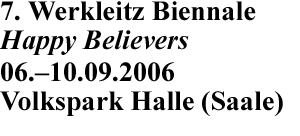
Welcome to the 7. Werkleitz Biennale
Happy Believers!
In recent years, the Werkleitz Biennale has dedicated itself to focus on issues with social relevance: from real[work] (2000), to Zugewinngemeinschaft (2002) and Common Property / Allgemeingut (2004), we have presented a different view on areas of social crisis with and thorough an artistic perspective. In Fall 2004, as we launched planning this year's biennial, something had already began to reshape what is today called the 'return of religion' - an increasing interest in religious issues, at least in the media. An astonishing process, considering that by the 1960s religion in the Western industrial societies was regarded as old fashioned, something that in the course of the further decades would disappear on its own accord. But on closer examination, it becomes clear that while the established churches have had to struggle long with declining interest, the need for transcendence, the need to believe, has been maintained. Many new forms can be found for this: from religiously embellished political ideologies, the fetishised world of commodities, the star cult, or even art.
The succession of various ideological models of an eordered faithf has perhaps nowhere been as radical as it has been in the states of what was once the Eastern Bloc, especially what was once the GDR - moving in but a few decades from empire to republic, from fascism, to socialism, to capitalism. The radical athetization of the GDR could have been followed by a return to faith after the fall of the wall, considering the fact that the churches played a key role in the overcoming of the regime: but such a re-theification did not come to pass. Saxony-Anhalt is the federal state in Germany where church membership is at its lowest. Instead, in what was once the GDR, people are increasingly searching for their own faith, combining from the most various offers what seems to fit them best. Is that now an expression of what we might call the new ideologies, individualism and globalisaiton? Or is it a form of self-determination? We can not answer this profound question, but the question, "What do I myself really believe in?h, what was for us an important component of preparing for the biennial, stretching from to the Round Tables, artist conversations, and the exhibition Moving Spirits. We would like to take this opportunity to invite you to join us in exploring these questions during the five days of the festival. As with all our biennials, the intense exchange between artists and the audience is central, and we look forward to your feedback.
Special thanks to the participating artists as well as the curators, who have developed Happy Believers in intense cooperation with one another. And our heartfelt thanks to all those who have worked to make this project a success, and all the sponsors and friends who made this biennial possible.
Marcel Schwierin, Monika Stösser, Peter Zorn
